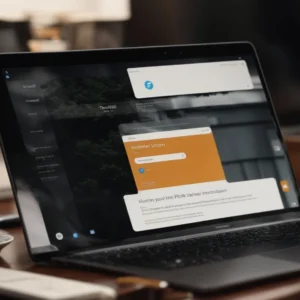Navigating Legal Strategies to Combat Phishing Allegations
Phishing scams, the deceptive acts of masquerading as a trusted entity to pilfer personal data, have surged with the relentless advance of technology and internet reliance.
These criminal ventures span from basic email fraud, designed to trick individuals into revealing sensitive information, to elaborate schemes targeting user login credentials, bank accounts, and credit card details.
Being on the receiving end of an allegation for such a crime can have harrowing implications on your freedom and future.
A robust understanding of legal terminology, coupled with a strategic defense, is vital for anyone entangled in the complex web of phishing accusations.
In this article, we unveil the essential steps and legal maneuvers to navigate these treacherous waters and clear your name.
Understanding Phishing Allegations and Legal Definitions
In the complex world of cybercrime, distinguishing a phishing allegation from other forms of internet deception requires a clear understanding of the terminology and legal frameworks in place.
In my journey through criminal defense, I’ve observed the surge in phishing attacks, a nefarious practice where users are duped into voluntarily surrendering sensitive information such as login credentials or credit card numbers.
To make matters worse, these scams cleverly disguise themselves as legitimate communication, often leading to unauthorized access to personal data.
Digesting the legal jargon surrounding phishing is the first step in crafting a formidable defense.
By comprehending the broad parameters of laws that encompass internet fraud, whether they’re tied to identity theft or credit card fraud, we can better grasp the severity of such charges and the protections against them.
As we traverse this legal landscape, we’re not merely talking about the theft of data but also a violation of privacy and trust that can lead to dire financial and reputational harm for a consumer.
Thus, recognizing how phishing fits within the scope of criminal law and how it’s prosecuted remains pivotal in advising clients and securing their rights.
Identifying What Constitutes a Phishing Allegation
Phishing allegations arise when perpetrators use deceptive emails or websites to trick users into revealing personal identification numbers, passwords, social security numbers, or other identifying information. This ruse often mirrors legitimate requests from reputable companies or government agencies, leading the victim to unwittingly compromise their data and privacy.
Within the legal framework, phishing transcends simple deception. It’s an assault on an individual’s digital safety, posing the risk of further crimes like identity theft, credit card fraud, and embezzlement. Therefore, when someone faces these allegations, a prosecutor must prove that the accused had the intent to use the obtained data for illicit purposes.
Breaking Down Legal Terminology Related to Phishing
When fleshing out a defense strategy against phishing allegations, a precise comprehension of the relevant legal terms becomes indispensable. Terms like “fraud” and “extortion” take on specific meanings within the criminal justice system; fraud typically refers to wrongful or criminal deception intended to result in financial or personal gain, while extortion is the practice of obtaining something, especially money, through force or threats.
Additionally, understanding the statute of limitations for crimes involving the internet, such as phishing, is critical for both the defense and prosecution. The statute sets forth the maximum time after an event within which legal proceedings may be initiated, which varies by jurisdiction and the severity of the alleged crime, from misdemeanors like simple phishing to felonies if phishing leads to more serious offenses such as identity theft or embezzlement.
Recognizing the Scope of Laws Governing Internet Fraud
Grasping the intricate web of laws that tackle internet fraud is essential, particularly as it pertains to phishing attacks. These laws, such as the Computer Fraud and Abuse Act, provide a framework to prosecute various cybercrimes by defining unauthorized access and addressing the malicious exploitation of computer systems and online identities.
My experience as a criminal defense lawyer has taught me that every phishing scam brings unique challenges and considerations under the law. The specific charges laid against an individual, whether for identity theft, wire fraud, or mortgage fraud, depend on the misuse of the stolen data and the jurisdiction in which the crime occurred.
Now that we’ve navigated the murky waters of phishing allegations and dissected the legal jargon, let’s turn our attention to the crucial next steps. Brace yourself as we explore the immediate actions you should take when facing the storm of a phishing accusation.
The Initial Steps After Being Accused of Phishing
Facing a phishing allegation can be a stormy sail, where strong legal defenses are your lifeline.
Navigating your next moves is critical, starting with the meticulous gathering and securing of electronic evidence.
Whether the charges stem from a misunderstood marketing strategy or a mistaken identity, confirming the truth of the situation is paramount.
Swiftness in assembling this digital defense can make the difference between a sentence and exoneration.
Equally important is involving a defense lawyer with an adept understanding of cyber law who can anchor your case.
With my reputation on the line, I’d immediately dive into a proactive approach, scrutinizing the legitimacy of the accusation and engaging an attorney who deftly maneuvers through the complexities of technology and privacy laws.
Gathering and Securing Electronic Evidence
Upon allegations of involvement in phishing, the immediate step is to compile a digital paper trail. This means securing all relevant electronic communications, including emails, browser histories, and transaction records, that could refute claims of criminal intent or demonstrate compliance with laws and privacy policies.
The strategic collection of logs from servers, timestamps from messages, and IP address records forms the bedrock of the defense. Therein lies proof that may disentangle my client from the web of accusations – preserving evidence is not just pivotal, it’s non-negotiable.
- Secure all electronic communications linked to the allegation immediately.
- Retrieve and protect browser histories and transaction records to demonstrate lawful behavior.
- Amass server logs, timestamps, and IP address histories to construct a factual timeline.
- Maintain confidentiality and integrity of the data to ensure its admissibility in court.
- Consult with cybersecurity experts to strengthen the understanding of the electronic evidence.
Assessing the Validity of the Accusation
Assessing the validity of the accusation thrown my way requires a meticulous evaluation of the evidence against me. It’s about separating the wheat from the chaff—differentiating between unfounded claims and substantiated allegations that could potentially derail a client’s reputation and financial stability.
I delve into the origins of the accusation, carefully examining each component for signs of entrapment or mistaken identity. My priority remains to dismantle any possibility that my client was coerced or that their personal or business email systems were compromised without their consent or knowledge.
Engaging a Skilled Cyber Law Attorney
Engaging a skilled cyber law attorney is the definitive move in ensuring my footing is secure on the treacherous terrain of cybercrime allegations. A lawyer with a deft handle on the intricacies of computer security, phishing methodologies, and relevant statutes becomes an essential ally in constructing a persuasive defense.
For many ensnared in phishers’ nets, a deep dive into legal statutes alone isn’t enough; the distinct expertise of a defense lawyer well-versed in technology and privacy laws proves to be the keystone for a favorable outcome in court.
| Step | Action | Outcome |
|---|---|---|
| 1 | Engage Cyber Law Attorney | Strategic Legal Representation Secured |
| 2 | Review Case Details | Assess Allegations and Formulate Defense |
| 3 | Analyze Electronic Evidence | Construct Factual Timeline and Refute Claims |
| 4 | Develop Legal Strategy | Prepare for Possible Trial or Settlement |
The moment of accusation sends a shockwave through your life; it’s time to take control. Let’s harness that adrenaline and channel it toward devising a robust defense strategy against these phishing charges.
Building Your Defense Strategy Against Phishing Charges
Staring down the barrel of phishing charges can feel akin to being caught in the crosshairs of a powerful storm—unpredictable and potentially devastating.
It’s here where my strategic acumen is summoned to its fullest; building a robust defense strategy is more akin to a carefully choreographed ballet than a haphazard scramble for justification.
This involves not only a thorough analysis of precedents set by previous case laws but also a keen focus on the evidence at hand and the alleged intent behind the action.
Furthermore, integrating technical expertise is not just advantageous—it’s imperative to distill complex technical details into a narrative that resonates with the reality of the situation and underscores my client’s position.
Analyzing Previous Case Laws and Their Relevance
Assessing the precedents set by earlier court cases is paramount when formulating a robust defense against phishing allegations. Insights from precedent can guide the strategic application of legal principles and help predict potential outcomes based on similarly adjudicated scenarios.
Every phishing case carries unique nuances, and a close examination of prior convictions and acquittals offers an invaluable compass for navigating the potential pitfalls and windfalls within the current legal environment. It’s vital to discern how past rulings might influence the presiding judge or jury’s perspective on the matter at hand.
| Case Component | Insight Gained | Strategic Use |
|---|---|---|
| Previous Rulings | Understanding of Legal Precedents | Application to Current Case Facts |
| Unique Nuances | Knowledge of Case Specifics | Custom Tailoring of the Defense Strategy |
| Impact on Present Case | Potential Influence on Judge/Jury | Preparation for Effective Argumentation |
Crafting a Defense Based on Evidence and Intent
The cornerstone of mounting a successful defense in the face of phishing allegations is the meticulous evaluation of the evidence paired with dissecting the intent attributed to the accused. It’s like piecing together a puzzle, ensuring every shred of documentation aligns precisely with my steadfast narrative that counters the prosecution’s claim and highlights the absence of criminal intent.
My focus remains razor-sharp on the digital trail, searching for inconsistencies or benign explanations for the actions my client has taken. Presenting plausible alternative scenarios to a judge or jury can promote doubt, and this seed of skepticism is often what tips the scales away from a conviction and towards the welcome embrace of acquittal.
Leveraging Technical Expertise in Your Defense
In mounting a defense against phishing charges, my strategy hinges on the ability to demystify complex technical evidence for the courtroom. Collaborating with computer security experts, I ensure that technical jargon is broken down to its essence, reinforcing my client’s claims of innocence and underlining any discrepancies in the prosecution’s digital evidence.
I prioritize a direct, engaging narrative when presenting technical evidence, which allows the jury and judge to appreciate the nuances of cybersecurity and the potential for mistakes or malicious actions unknowingly taken by my client. This approach draws from an in-depth understanding of the digital realm, transforming abstract concepts into compelling, relatable testimony that bolsters the defense.
Navigating the treacherous waters of phishing charges requires a stout defense. Let’s thrust into the digital realm, where forensics become our sword in parrying these allegations.
The Role of Digital Forensics in Fighting Phishing Allegations
Stepping into the digital ring to defend against a phishing allegation requires wielding the nuanced sword of digital forensics—a technological field that’s as intricate as it is pivotal in combatting cybercrime charges.
It’s my role to navigate this complex terrain, ensuring that every kilobyte of digital evidence is meticulously collected and scrutinized to dismantle the prosecution’s narrative.
Engaging this scientific process means not only understanding the pathways through which data travel but also presenting it in court through expert witnesses who can elucidate the often-arcane language of technology.
If the art of defense is in the detail, then digital forensics is the masterstroke in painting my client in truth’s light.
Collecting Digital Evidence to Refute Claims
In the realm of digital forensics, my approach is to gather and analyze the electronic breadcrumbs left behind during the alleged phishing incident. The objective is to uncover concrete evidence that can effectively dispute the charges levied against my client: timestamps that contradict the timeline of accusations, email headers that reveal the true origin of a disputed message, and login records that can verify my client’s location at relevant times.
- Examine email headers for originating IP addresses that could exonerate my client.
- Review login records to establish an alibi contradicting the prosecution’s timeline.
- Analyze metadata from documents or images linked to the phishing incident for discrepancies.
Deploying digital forensics means not only collecting relevant data but ensuring its integrity is maintained from the point of acquisition to its presentation in court. This meticulous process ensures that digital artifacts are not only admissible but also compelling, painting a clear narrative that challenges the prosecution’s assertions with indisputable facts and technical insights.
Understanding the Forensic Analysis Process
Grasping the forensic analysis process involves more than a cursory look into a user’s activity; it requires sifting through digital evidence with a fine-toothed comb. As I confront phishing allegations head-on, my adeptness with this intricate process allows me to authenticate sources, chronologies, and activities associated with the contested data to either implicate or exonerate my client.
Diving deeper into the matrix of digital logs, I decode the subtle digital fingerprints imprinted on each piece of evidence. It’s a rigorous examination under a digital microscope—evaluating intricate trails from email servers, scrutinizing meta-data within compromised files, and verifying the integrity of login sequences—all in a concerted effort to uncover the truth and cement my client’s defense.
Utilizing Experts to Interpret Technical Data
Calling upon experts to interpret technical data is like shining a spotlight on key evidence during a trial. Their insights can turn the tide, as they elucidate the nuances of the digital evidence, making the complex understandable and accessible to the layperson on a jury or even to the judge presiding over the case. Their role is crucial; they translate the binary code of the cyber world into a compelling story of innocence or guilt.
I make it a priority to collaborate with professionals who are not just adept in digital forensics but also skilled communicators. It’s their testimony that often bridges the gap between the technical aspects of the case and the understanding required for a fair judgment. This collaborative effort ensures the evidence is not just presented, but its significance is rightly interpreted, giving my client the robust defense they deserve.
With the insights of digital forensics shedding light on the murky depths of phishing allegations, we stand on the precipice of legal maneuvering. Let’s pivot to the art of negotiation where settlements and plea bargains take center stage.
Negotiating Settlements and Plea Bargains
Stepping confidently into the negotiation phase of a phishing allegation is a critical tactical move in my playbook.
With the electronic evidence laid out and the intricacies of the case dissected, now comes a moment of decisive action – evaluating whether to entertain a settlement or move toward a plea agreement.
Each path is wrought with its unique set of variables, and as a battle-hardened navigator of the legal seas, I’m tasked with weighing the advantages and risks, aiming to secure the most advantageous outcome for my client.
The art of negotiation in these legal waters requires finesse, an in-depth understanding of when to hold firm and when flexibility might yield a more favorable result.
Forging ahead, my focus sharpens on translating complex legal maneuvering into strategic decisions that hold the promise of a reduced sentence or even a dismissed charge.
The line of attack in these dialogues often defines my client’s fate, and I’m resolved to walk that line with precision and persuasive advocacy.
Evaluating the Pros and Cons of Settling
In the delicate balance of assessing whether to settle phishing allegations, I closely examine the merits and weaknesses of my client’s position. Settling can be an astute move to mitigate risk, possibly curtailing the financial and emotional toll associated with drawn-out legal proceedings and the potential for damaging publicity that a trial might bring.
On the flip side, settling carries its own caveats; it can suggest an admission of guilt, influencing my client’s record and future opportunities. This approach must be weighed against the prospects of vindication through a trial, which, while uncertain, might fully exonerate my client and restore their reputation, standing firm against the allegations faced.
Understanding How Plea Bargains Work
Plea bargains are a nuanced element of the criminal justice system, often serving as a middle ground where the defense and prosecution agree to resolve a case without the uncertainty of a trial. In my practice, I advocate assertively on behalf of my clients, negotiating plea agreements that might result in lesser charges or reduced sentencing, depending on the strength of the evidence and the circumstances of the alleged phishing incident.
In navigating these plea discussions, my aim is to uphold my client’s best interests, dissecting the ramifications of each component of the deal. With a comprehensive understanding of my client’s wishes and the potential outcomes on the table, I’m poised to ensure any agreement is consciously decided upon, integrating their right to a fair resolution with the realities of their legal situation.
Strategies for Achieving Favorable Negotiations
Entering the negotiation room, I carry with me a complete understanding of my client’s rights and the particulars of their case; this is my leverage. My unwavering focus is not on winning small skirmishes but on securing a victory that aligns with my client’s long-term goals and minimizes the long shadow cast by an allegation of phishing. It’s about crafting an agreement that respects my client’s interests while acknowledging prosecutorial concerns—a delicate balancing act I’m well versed in.
Utilizing a keen sense of timing and a compelling argumentation style, I hone in on crucial elements that could shift prosecutorial perspectives in my client’s favor. During these critical discussions, I maintain a vigilant stance, ready to dismantle the prosecution’s case through strategic concessions and persuasive narratives designed to highlight the strengths of our position and the potential frailties in the state’s accusations.
We’ve explored every avenue to resolve the case outside the courtroom, yet settlement efforts have reached an impasse. The gavel’s echo now signals a shift in focus, pushing us towards the crucial phase of trial preparation where meticulous strategy and unwavering diligence become our guiding stars.
Preparing for Trial: Key Considerations and Strategies
As I steel myself for the courtroom battle ahead, each step is calculated with precision, crafted to strengthen the bastion of my client’s defense against phishing allegations.
The meticulous selection of expert witnesses in cyber law and digital forensics forms the vanguard of our defense, bringing a potent combination of expertise and clarity to complex technical evidence.
Sharpening the narrative of innocence through the careful preparation of testimony ensures my client’s voice resonates with candor and conviction.
Forethought in jury selection and mastery in weaving compelling trial narratives are instrumental, setting the stage for a narrative that not only dissects the prosecution’s arguments but also vividly portrays the truth of the matter.
As we advance towards the trial phase, it is these strategic considerations that will define the path—whether leading to acquittal or a more favorable outcome in the fierce contest for justice.
Selecting Expert Witnesses in Cyber Law and Digital Forensics
Choosing the right expert witnesses in cyber law and digital forensics is pivotal as we approach the trial. Their testimony can often turn the tide, as they possess the specialized knowledge necessary to clarify the intricacies of phishing schemes and the digital trails left behind.
Their ability to communicate complex technical information in a clear and concise manner is essential. It enables the judge and jury to follow the digital breadcrumb trail, understand the implications of the evidence presented, and appreciate the nuances of a strong defense in a phishing case.
Preparing Your Testimony and Defense
When shaping the foundation of your defense in a phishing case, your testimony is your sword and shield, etching a narrative of truth that will stand up against the prosecution’s onslaught. Crafting this testimony involves not just recounting events with accuracy, but also conveying your story with the right blend of factual clarity and personal authenticity, ensuring it resonates with the jury and establishes your credibility.
My focus intensifies as I mold the defense; understanding that every word uttered on the stand can drastically swing the outcome of the trial. It’s a meticulous process, strategizing each response to anticipate cross-examination tactics and reinforcing the theme of innocence with unwavering consistency, all while maintaining a compelling, human element to engage the jury’s empathy and understanding.
Strategizing on Jury Selection and Trial Narratives
In the arena of the courtroom, successfully navigating a phishing trial hinges on my ability to select a jury primed to be receptive to our defense narrative. This requires a deep understanding of juror profiles and the ability to discern biases or predispositions that could affect the outcome of the case, ensuring that those seated in the jury box maintain an open mind about the complexities of cyber law and digital evidence.
Simultaneously, weaving the trial narrative requires precision and strategy, akin to a chess master anticipating moves several steps ahead. I craft this narrative to clearly illustrate my client’s innocence, forging an unwavering thread through the testimony and evidence that not only educates but also connects with jurors on a level that transcends the technical nature of the alleged cybercrime, emphasizing the absence of criminal intent.
Conclusion
Navigating legal strategies against phishing allegations is pivotal, as it involves disentangling complex technical evidence and crafting a defense rooted in a clear understanding of cyber law.
Engaging a skilled lawyer, experienced in digital forensics and cybersecurity, is crucial to effectively interpreting digital trails and articulating a defense narrative.
A meticulous approach to gathering, analyzing, and presenting evidence can shift the scales towards acquittal, highlighting the absence of criminal intent.
Ultimately, a strategic legal response assures protection of one’s rights, reputation, and future in the face of daunting cybercrime accusations.





